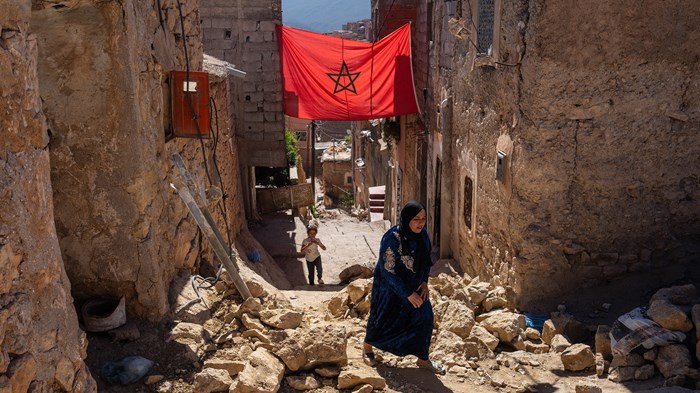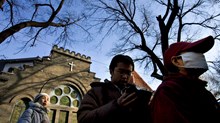
Local and foreign Christians have joined in relief efforts following last week’s massive earthquake in Morocco.
Nearly 3,000 people have died, with more than 5,000 injured. Registering 6.8 on the Richter scale, it is the North African nation’s most powerful quake since 1969 and its deadliest since 1960.
But far from the epicenter near the historic city of Marrakesh, gathered believers all had the same question.
“No one ever asks of disasters, ‘Why did it happen to them?’” said Youssef Ahmed, a senior member of Tangier Northern Church, 350 miles away. “But when it hits you, everyone wants to know God’s will.”
The house church service went much longer than usual.
Although Morocco only recognizes Islam and Judaism as domestic faiths, local believers generally say the government permits them to worship quietly in their homes—under a protective but thorough surveillance. Alcohol and pork, forbidden by sharia, are also freely available in the country. About 15 percent of citizens declare themselves nonreligious, while only 25 percent express trust in clerical leadership.
“We are not restricted in Morocco,” said Ahmed. “Just don’t be a nuisance.”
The latest US State Department report on Morocco indicates that, while “undermining the Islamic religion” is punishable with up to five years in prison, there are no known cases of Christians running afoul of the law.
But that Sunday, the former Muslims had other concerns on their mind.
“Why did it happen? We cannot know. Was it because of sin? We cannot know. Was it a test, like with Job? We cannot know,” said Ahmed, who led the lengthy discussion. “All we know is that God allowed it to happen, and his ways are righteous. We keep our faith in him.”
Encouraged in their walk, they went out to serve.
The congregation is a part of the 36-member Union of Christian Churches, which Ahmed founded in 2010. Congregants traveled south with supplies to see what they could do.
Attempting to reach isolated villages in the Atlas Mountains, where many mud-brick homes were destroyed, they were turned back by roadblocks which permitted only relatives to enter. Continuing on to Jemaa al-Fnaa Square in Marrakesh, they encountered a mass of humanity camped out in fear of continuing aftershocks. They quickly joined in with the multitude of Moroccans—and tourists—distributing water and blankets.
Much of the 9th-century UNESCO World Heritage site was undamaged, including the medieval Kotoubia Mosque which overlooks the square. But a less famous minaret had collapsed, as had portions of the 12th-century city wall. Badly damaged also was the earth-and-stone Tinmel Mosque, built by the Almohad dynasty in an Atlas Mountain valley 60 miles away before the Berber caliphate conquered Marrakesh and moved onward to Spain.
One Moroccan pastor estimates the church today is 80 percent Berber.
Meanwhile, from the southern city of Agadir, 150 miles southwest of the epicenter, Rachid Imounan was also trying to help. As leader of a local network of about 150 Christians, he worked with his community to distribute food, clothes, and medicine, as well as visit the injured in the city hospital. Bold where appropriate, he sought to give a “pleasant spiritual message” about salvation.
“This is what the Bible teaches us, to be together in joy and sorrow,” Imounan said. “We do not have much, but we have spiritual power.”
The Moroccan Association of Human Rights estimates there are 25,000 Christian citizens in the country, according to the US State Department, while foreign leaders estimate an expat community of approximately 10,000 Protestants and 30,000 Roman Catholics.
Last Sunday, Pope Francis joined in solidarity and prayed for earthquake victims.
“We stand with the people of Morocco,” he stated, as the Vatican offered its help.
In 2016, Morocco hosted hundreds of Muslim leaders to issue the Marrakesh Declaration, pledging to protect historic Christian minorities as ISIS ravaged Syria and Iraq. In 2019, Francis visited the kingdom as part of his ongoing outreach to the Muslim world. And hosting a global parliamentarian conference last June, Moroccan king Mohammed VI reiterated his nation’s commitment to ensure the “free exercise of religious worship” to all foreign Christians.
Yesterday, he made a personal $100 million donation to earthquake relief.
Ahmed said the international Protestant churches of Tangiers, Casablanca, and Marrakesh have joined in the overall effort.
So also has People in Mission International (PMI), a Latin American agency working in Muslim nations. In fellowship with many other colleagues, they have set up a base camp to distribute emergency supplies as they raise funds to support the displaced.
“We are trying to be the hands and feet of Jesus, to incarnate his love,” said the PMI field coordinator, requesting anonymity per agency policy. “And in support of the church, day by day we are seeing more unity as expats and local believers work together.”
The latter cannot legally work alone.
“The church is not registered, so it is unable to do official relief,” said Adam Rabati, president of the Union of Moroccan Christians, a grouping of 65 house churches. “We have always been rejected by our families and the conservative society.”
Living 200 miles north of the epicenter in Rabat, he said his village home was also damaged in the earthquake. While his union is also seeking to help the displaced, he has long campaigned to secure official recognition of local Christians and the religious rights of marriage, burial, and children’s education.
And while their situation deteriorated during the previous decade governed by Islamist politicians, Rabati stated that believers will still have to fight for their demands under the liberal government elected in 2021.
Open Doors ranks Morocco No. 29 on its World Watch List of nations where it is hardest to be a Christian, while the law prohibits “shaking the faith of a Muslim.”
A 25-year old second-generation pastor’s daughter, shares Rabati’s opinion. As a student she chafed at having to memorize the Quran and Islamic prayer rituals, and told no one of her real faith.
“Moroccan Christianity is very weak,” she said of the impact of nonrecognition. “We live our faith secretly and worship underground.”
But the earthquake may be pulling some local Christians out of their shell.
Living in Casablanca, her house shook but suffered no material damage. She declined to give her name and the name of her agency for security reasons, but with it and other Christians, she has distributed food, clothes, tents, and other necessities.
Everywhere she goes she encounters mortality. Navigating the near-impassable mountain roads to reach isolated villages, she witnessed other drivers veer off to their death. And then, upon arrival, she is hit with a pungent reality—the stench of decomposing bodies trapped under the rubble.
Relief work keeps her awake until 2 a.m., and for a very specific reason.
“It’s so important for us as Christians to have a positive impact on our society,” she said, “and to show the world who Jesus is.”
The Al Yassamine Association exists for the same reason.
Created in 2007 by Mustafa Soussi, the former Islamist activist wanted his faith in Christ to shine in the world. In application of James 2:26—faith without works is dead—his organization works for sustainable development in the same Moroccan areas devastated by the earthquake. He is from Taroudant, 150 miles south of Marrakesh.
Commonly known for its Christian leadership, Al Yassamine was first on the scene.
Like other believers, Soussi distributed food, clothes, and medicine—going first to the remote areas not yet reached by the government or other aid agencies. But unlike fellow Christians interviewed by CT, his group is registered with the proper authorities, and therefore official.
“We cannot work in earthquake relief in the name of the church,” Soussi said. “But as an association, we have the legal right to help the affected people.”
He employs Muslims side-by-side with Christians, and aids both the same. Less concerned to witness verbally than to embody Matthew 7:16—by their fruit you will know them—Soussi serves not as a believer in Jesus but as a proud citizen, awaiting any question about his faith.
But he has a prevailing motivation.
“My country made me who I am today,” Soussi said. “I want us to understand that Morocco is not only for Muslims.”
Raised in a devout family, his parents and siblings refused to talk to him after his conversion to Christianity in 1994. Nine years later, he and others named their house church after the prophet Job, identifying with the Old Testament character’s patience in the face of great suffering.
But by 2009, Soussi’s family accepted him back—and now even seeks his counsel.
The figure of Job, of course, is a perfect prophet for times of national disaster. And as Ahmed’s colleagues distributed their water to the displaced in Marrakesh, like Soussi, they announced no particular religious distinction.
But they did aim to prompt reflection about God’s will.
“All we told them was: God loves you,” said Ahmed. “But it might open up conversations: If he loves me, why did this happen?”
Some recipients engaged; some did not. With all, the believers sought to act wisely, knowing the government could be watching. But there is no law against talking to people, he said, and actions speak louder than words.
“Muslims are our neighbors,” Ahmed said. “There may not be an impact now, but we are planting a seed.”

Support Our Work
Subscribe to CT for less than $4.25/month

















